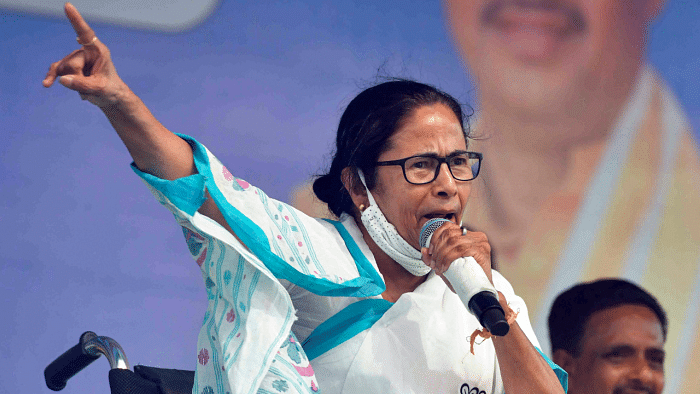
West Bengal is witnessing a rare instance of the judiciary expressing its lack of confidence in the state government's handling of cases related to law and order, which is a state subject.
Five cases have been handed over to the Central Bureau of Investigation (CBI) by the Calcutta High Court in the last month. The incidents range from burning alive women and children in Bogtui village of Birbhum district to rape and alleged killing of a minor in Hanskhali village of Nadia district.
The other three cases relate to a Congress councillor's murder, the alleged suicide of the eyewitness of the councillor's murder, and Bhadu Sheikh's murder that instigated the brutal violence in Bogtui. Another case, the murder of young activist Anis Khan allegedly by the police, is still hanging fire, as the culprits have not been identified even after two months.
The local police deal with such crimes everywhere in India in the normal course. But the involvement of the Trinamool Congress (TMC) local level leaders and the glaring inaction of the police has forced the court to refer these cases to the CBI.
More shocking was Chief Minister Mamata Banerjee's shaming of the killed rape victim of Hanskhali. "Was it rape, a love affair, or the girl was pregnant?" she questioned, going on to ask the director-general of the state police present on the stage for endorsement that came instantly. A day later, her party Lok Sabha member Mohua Moitra pointed out that even consensual sex with a minor is considered rape according to law.
These cases have been added to several the CBI has been probing for the last few months, though without tangible headway. Various TMC middle and top-level leaders are being questioned in these cases related to cattle smuggling and coal and sand scams. An investigation related to post-poll violence is also with the CBI.
In another incident, Justice Abhijit Gangopadhyay, under whose auspices the contours of corruption have been exposed in the School Service Commission employment, faced a blockade of his courtroom by the lawyers loyal to the ruling party in protest of his ordering the CBI enquiry into the matter. This adds another dimension to the crisis - the possibility of a breakdown in the deliverance of free and fair justice in the state.
Altogether, an unprecedented environment of anarchy has been prevailing since mid-March in Bengal. Incidents of attacks, bombing or firing, and killings and rapes are being reported from various parts of the state almost every day, including Kolkata. In several cases, the TMC's involvement is evident, and the attacks target the opposition and even competing factions of the party.
The tragedy is that the reference to the CBI is not a guarantee of ensuring justice, as we all know the fate of these cases will depend on the whims of the leadership of the ruling party at the Centre. Modi has even cautioned an opposition MP in Parliament that he could be killed if the MP went to Bengal. But what about the people of Bengal? Does the prime minister have any answer?
Perhaps it is a sad story of Indian democracy and raises questions about the logic of law enforcement agencies being controlled by politicians, be it in the states or at the Centre, particularly the postings of the Indian Police Service (IPS) officers.
The way the lower levels of the TMC have become desperate and use the police to guard their acts of omissions and commissions and other interests, it is unlikely that the situation will improve soon. Bengal is fast turning into a failed law-and-order state.
India has seen riots in Gujarat and terrorist activity in Jammu and Kashmir in this century. But what is happening in Bengal is somewhat unprecedented. The state is sinking into darkness because of the nexus between the lower echelons of the ruling party, anti-social elements, and the police.
So, what is the way forward? Indeed, Article 356 of the constitution should not be used after the colossal victory the TMC had scored just a year ago. The Congress parliamentary party leader, who is also its state unit president, Adhir Chowdhury, has suggested imposing Article 355 in Bengal. This provision, which has never been invoked, allows the Centre to take up the responsibility of maintaining the law and order of a state. Indications are that the Left is not opposed to the idea.
The makers of our constitution certainly had some situation in mind when they incorporated Article 355. If the state government fails to revive the neutrality of the law enforcers soon, probably Bengal will match the conditions the makers of our constitution had in their mind.
(The writer is a journalist and author based in Kolkata)
Disclaimer: The views expressed above are the author’s own. They do not necessarily reflect the views of DH.
Check out the latest DH videos here: